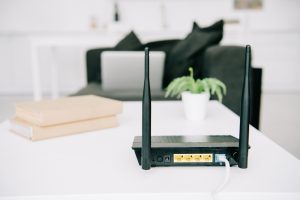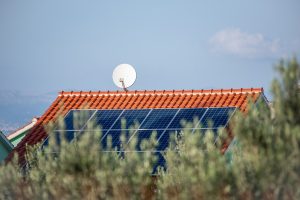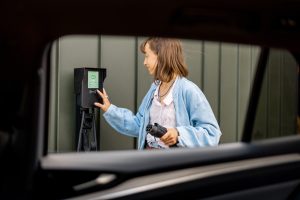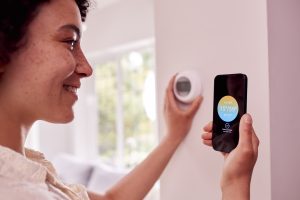Thinking about solar panels for your home? It’s a big decision that needs careful thought. At Martin Kaine Electrical, we want you to have all the facts before you commit. Here’s what you need to know before installing solar panels.
Check if Your Home is Suitable
Not every home is right for solar panels. Before getting too excited, check these basics:
Your Roof
- Direction: South-facing roofs get the most sun in the UK. East or west-facing roofs can work too, but you’ll generate about 15-20% less electricity.
- Angle: A roof pitch of 30-40 degrees is best for the UK.
- Shade: Trees, buildings or chimneys that cast shadows on your roof will reduce how much power you generate.
- Size: You need roughly 15-20 square metres of roof space for a standard system.
- Condition: Your roof should be in good repair. If you need a new roof soon, do that work before adding solar panels.
Your Location
The UK gets enough sunlight for solar panels to work well, but some areas get more sun than others. Southern England typically gets more sunshine than Scotland or Northern Ireland, but solar panels are still worthwhile across the UK.
Planning Permission
Most homes don’t need planning permission for solar panels, but you might if:
- You live in a listed building
- Your home is in a conservation area
- The panels would stick out more than 200mm from your roof
It’s always worth checking with your local council before going ahead.
Understand the Costs
Solar panel prices have dropped a lot in recent years, but they’re still a significant investment.
Upfront Costs
For a typical 3-4 bedroom house, expect to pay:
- £4,000-£6,000 for a standard solar panel system (about 3.5kW)
- £2,000-£4,000 extra if you want battery storage
- £800-£1,000 for a solar immersion heater (to use excess electricity for hot water)
These prices include VAT, installation and connecting to your home’s electricity system.
Ongoing Costs
Solar panels need very little maintenance, but you should budget for:
- Occasional cleaning (you can do this yourself or pay around £100-£150 for professional cleaning)
- Inverter replacement after 10-15 years (£800-£1,000)
- Annual system check (about £100-£150)
Financial Returns
On the plus side, you’ll save money through:
- Lower electricity bills (typically £300-£500 per year)
- Payments for excess electricity you send to the grid (£50-£100 per year through the Smart Export Guarantee)
Most systems take 10-15 years to pay back their cost, while the panels typically last 25-30 years.
Choose the Right System Size
Getting the right size system matters. Too small, and you won’t generate enough power. Too large, and you’ll pay for capacity you don’t need.
A good installer will look at:
- Your electricity usage (check your bills for this)
- When you use most electricity (day or evening)
- Your roof size and condition
- Your budget
For most UK homes, a system between 3kW and 4kW works well. This typically means 8-12 panels, depending on their power output.
Understand How Solar Works With Your Home
Solar panels change how your home gets and uses electricity. Make sure you understand:
Grid Connection
Your home stays connected to the national grid. This means:
- You can still use grid electricity when your panels aren’t generating enough
- Any excess electricity you generate can be exported to the grid
Electricity Usage Timing
Solar panels generate most electricity during daylight hours. To get the most benefit:
- Try to use appliances like washing machines and dishwashers during the day
- Consider timer switches to run appliances when your panels are generating
Battery Storage
Without batteries, you’ll use grid electricity when the sun isn’t shining. Adding batteries lets you store excess daytime generation for evening use, but adds significant cost.
Monitoring System
Most modern installations include a monitoring system that shows:
- How much electricity you’re generating
- How much you’re using
- How much you’re exporting to the grid
This helps you understand and optimise your energy usage.
Choose a Qualified Installer
The quality of installation makes a huge difference to how well your system works and how long it lasts.
Look for installers who are:
- MCS certified (Microgeneration Certification Scheme)
- RECC members (Renewable Energy Consumer Code)
- Well-established with good reviews and references
- Willing to visit your property before giving a quote
- Happy to answer all your questions clearly
- Offering a good warranty (at least 10 years for the installation)
Get at least three quotes and be wary of anyone pushing for a quick decision.
Understand the Installation Process
Knowing what to expect helps the installation go smoothly:
- Survey: A detailed roof and electrical survey
- Scaffolding: Usually needed for safe roof access
- Mounting system: Fitted to your roof to hold the panels
- Panel installation: The panels are secured to the mounting system
- Wiring: Connected to an inverter (usually in your loft)
- Inverter connection: Linked to your consumer unit (fuseboard)
- Testing: Full system testing before handover
- Paperwork: Including warranty documents and MCS certificate
Most installations take 1-2 days. You’ll need to be at home, and your electricity will be turned off for short periods.
Check Your Insurance
Before installation, tell your home insurance provider about your plans. Some policies cover solar panels automatically, but others need an update. Not telling your insurer could affect future claims.
Think About the Future
Solar panels are a long-term investment, so consider:
- How long you’ll stay in your home: You’ll get the most benefit if you stay for at least 10 years
- Electric vehicles: If you might get an electric car in the future, this could change your electricity needs
- Home batteries: Technology is improving and prices are falling, so you might add these later
- Selling your home: Solar panels can make your home more attractive to buyers, but not everyone values them equally
Ready to Move Forward?
If you’ve checked all these points and want to go ahead, your next steps are:
- Get detailed quotes from at least three MCS-certified installers
- Check reviews and ask for references from previous customers
- Make sure the quote includes everything (parts, labour, scaffolding, registration)
- Check what warranties are offered and what they cover
- Only pay a small deposit until work is completed to your satisfaction
At Martin Kaine Electrical, we provide honest, clear advice about solar panel installation. We’ll help you decide if solar is right for your home and guide you through the whole process.
Contact us today for a no-pressure chat about your solar options.




